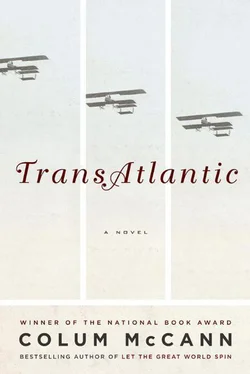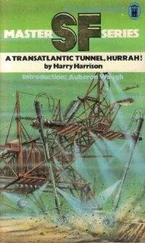To level out the meadow, they crimped blasting caps to fuses, shattered boulders with dynamite, leveled walls and fences, removed hillocks. It was summertime but still there was a chill in the air. Flocks of birds moved fluidly across the sky.
After fourteen days the field was ready. To most people it was simply another patch of land, but to the two pilots it was a fabulous aerodrome. They paced the grass runway, watched the breeze in the trees, looked for clues in the weather.
CROWDS OF RUBBERNECKERS flocked to see the Vimy. Some had never ridden in a motorcar, let alone seen a plane before. From a distance it looked as if it had borrowed its design from a form of dragonfly. It was 42.7 feet long, 15.25 feet high, with a wingspan of 68 feet. It weighed 13,000 pounds when the 870 gallons of petrol and the 40 gallons of oil were loaded. Eleven pounds per square foot. The cloth framework had thousands of individual stitches. The bomb spaces were replaced by enough fuel for 30 hours of flying. It had a maximum speed of 103 miles per hour, not counting the wind, a cruising speed of 90 mph and a landing speed of 45 mph. There were two water-cooled Rolls-Royce Eagle VIII engines of 360 horsepower and a turnover rate of 1,080 revs per minute, with twelve cylinders in two banks of six, each engine driving a four-bladed wooden propeller.
The onlookers ran their hands along the struts, tapped the steel, pinged the taut linen of the wings with their umbrellas. Kids crayoned their names on the underside of the fuselage.
Photographers pulled black hoods over their lenses. Alcock mugged for the camera, shaded his hand to his eyes like an ancient explorer. Tally-ho! he shouted, before jumping the nine feet to the wet grass below.
THE NEWSPAPERS SAID anything was possible now. The world was made tiny. The League of Nations was being formed in Paris. W. E. B. Du Bois convened the Pan-African Congress with delegates from fifteen countries. Jazz records could be heard in Rome. Radio enthusiasts used vacuum tubes to transmit signals hundreds of miles. Some day soon it might be possible to read the daily edition of the San Francisco Examiner in Edinburgh or Salzburg or Sydney or Stockholm.
In London, Lord Northcliffe of the Daily Mail had offered £10,000 to the first men to land on one side of the Atlantic or the other. At least four other teams wanted to try. Hawker and Grieve had already crashed into the water. Others, like Brackley and Kerr, were positioned in airfields along the coast, waiting for the weather to turn. The flight had to be done in seventy-two hours. Nonstop.
There were rumors of a rich Texan who wanted to try, and a Hungarian prince and, worst of all, a German from the Luftstreitkräfte who had specialized in long-range bombing during the war.
The features editor of the Daily Mail , a junior of Lord Northcliffe’s, was said to have developed an ulcer thinking about a possible German victory.
— A Kraut! A bloody Kraut! God save us!
He dispatched reporters to find out if it was possible that the enemy, even after defeat, could possibly be ahead in the race.
On Fleet Street, down at the stone, where the hot type was laid, he paced back and forth, working the prospective headlines over and over. On the inside of his jacket his wife had stitched a Union Jack, which he rubbed like a prayer cloth.
— Come on boys, he muttered to himself. Hup two. On home now, back to Blighty.
EVERY MORNING THE two airmen woke in the Cochrane Hotel, had their breakfast of porridge, eggs, bacon, toast. Then they drove through the steep streets, out the Forest Road, towards a field of grass sleeved with ice. The wind blew bitter blasts off the sea. They rigged wires into their flight suits so they could run warmth from a battery, and they stitched extra fur on the inside flaps of their helmets, their gloves, their boots.
A week went by. Two weeks. The weather held them back. Cloud. Storm. Forecast. Every morning the men made sure they were carefully shaved. A ritual they performed at the far end of the field. They set up a steel washbasin under a canvas tent with a little gas burner to heat the water. A metal hubcap was used as a mirror. They put razor blades in their flight kits for when they landed: they wanted to make sure that if they were to arrive in Ireland, they would be fresh, decently shaved, presentable members of Empire.
In the lengthening June evenings, they fixed their ties, sat under the wingtips of the Vimy, and spoke eloquently to the Canadian, American, British reporters who gathered for the flight.
Alcock was twenty-six years old. From Manchester. He was lean, handsome, daring, the sort of man who looked straight ahead but stayed open to laughter. He had a head of ginger hair. A single man, he said he loved women but preferred engines. Nothing pleased him more than to pull apart the guts of a Rolls-Royce, then put her back together again. He shared his sandwiches with the reporters: often there was a thumbprint of oil on the bread.
Brown sat on the wooden crates alongside Alcock. He already seemed old at thirty-two. His bum leg forced him to carry a walking stick. He had been born in Scotland, but raised near Manchester. His parents were American and he had a slight Yankee accent that he cultivated as best he could. He thought of himself as a man of the mid-Atlantic. He read the antiwar poetry of Aristophanes and admitted to the idea that he would happily live in constant flight. He was solitary but did not enjoy loneliness. Some said he looked like a vicar, but his eyes flared a far blue, and he had recently gotten engaged to a young beauty from London. He wrote Kathleen love letters, telling her that he wouldn’t mind throwing his walking stick at the stars.
— Good God, said Alcock, you really told her that?
— I did, yes.
— And what did she say?
— Said I could lose the walking stick.
— Ah! Smitten.
At the press briefings, Alcock took the helm. Brown navigated the silence by fiddling with his tie clip. He kept a brandy bottle in his inside pocket. Occasionally he turned away, opened the flap of his tunic, took a nip.
Alcock drank, too, but loudly, publicly, happily. He rested against the bar in the Cochrane Hotel and sang Rule, Britannia in a voice so out of tune that it was loaded with whimsy.
The locals — fishermen mostly, a few lumberjacks — banged on the wooden tables and sang songs about loved ones lost at sea.
The singing went on late into the night, long after Alcock and Brown had gone to bed. Even from the fourth floor they could hear sad rhythms breaking into waves of laughter and then, later still, the Maple Leaf Rag hammered out on a piano.
Oh go ’way man
I can hypnotize dis nation
I can shake de earth’s foundation with the Maple Leaf Rag
ALCOCK AND BROWN rose at sunup, then waited for a clear sky. Turned their faces to the weather. Walked the field. Played gin rummy. Waited some more. They needed a warm day, a strong moon, a benevolent wind. They figured they could make the flight in under twenty hours. Failure didn’t interest them, but in secret Brown wrote out a will, gave everything he owned to Kathleen, kept the envelope in the inside pocket of his tunic.
Alcock didn’t bother with a will. He recalled the terrors of the war, still surprised at times that he could wake at all.
— There’s puff all else they can throw at me now.
He slapped the side of the Vimy with his palm, took a look at the clouds massing far off in the west.
— Except of course some more ruddy rain.
ONE GLANCE DOWN takes in a line of chimneys and fences and spires, the wind combing tufts of grass into silvery waves, rivers vaulting the ditches, two white horses running wild in a field, the long scarves of tarmacadam fading off into dirt roads — forest, scrubland, cowsheds, tanneries, shipyards, fishing shacks, cod factories, commonwealth, we’re floating on a sea of adrenaline and — Look! Teddy, down there, a scull on a stream, and a blanket on the sand, and a girl with pail and shovel, and the woman rolling the hem of her skirt, and over there, see, that young chap, in the red jersey, running the donkey along the shore, go ahead, give it one more turn, thrill the lad with a bit of shadow …
Читать дальше












